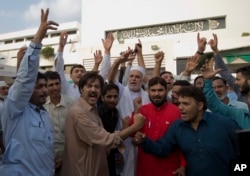Pakistan’s newly-elected National Assembly on Friday formally chose Imran Khan as prime minister, successfully marking second peaceful transition from one democratically elected government to another in the country’s 70-year political history, which has been marred by military interventions and turmoils.
Cricket hero-turned-politician Khan, 65, leader of the Pakistan Tehreek-i-Insaf (PTI) party, captured 176 of the 272 ballots cast in the lower house of Parliament.
The PTI won the most seats in July 25 parliamentary elections, but it needed the support of independents and small political groups in the 342-seat house to get Khan elected Friday.
Khan's rival candidate of the Pakistan Muslim League-N (PML-N) party, Shahbaz Sharif, secured 96 votes.
The opposition candidate is the younger brother of thrice-elected former prime minister, Nawaz Sharif, who was convicted and sentenced last month to 10 years in jail on corruption charges.
As the speaker of the National Assembly house announced Friday’s results, PML-N members began chanting and marching across the house in protest, alleging Khan’s victory in last month’s polls was the outcome of rigging orchestrated by the military.
The protest prompted the speaker to temporarily suspend the proceedings of the house to persuade opposition lawmakers to maintain order and allow Khan to deliver a customary speech to outline his new government’s policies.
Khan later addressed the house amid noisy opposition protest and vowed to hold accountable without discrimination anyone involved in corruption and siphoning off national wealth out of Pakistan.
His anti-corruption campaign against Sharif and his family’s overseas assets resonated widely, especially among younger Pakistanis clamoring for change, playing role in his party’s election victory.
“The money that was laundered, I will bring it back, the money that should have gone towards health, education, and water, went into people's pockets," Khan vowed.
He dismissed election rigging charges and promised the PTI government will fully cooperate with the opposition in investigating them.
The third largest political group in the parliament, Pakistan Peoples Party (PPP) of slain ex-Pakistani leader, Benazir Bhutto, abstained from the voting process in the 342-member house.
The independent Election Commission of Pakistan has already rejected rigging charges as unfounded, though it admitted failure in the electronic reporting system that resulted in delayed announcements of results on the polling day.
The PML-N and the PPP have ruled Pakistan repeatedly when the military has not been in power. Khan’s victory has for the first time prevented from making it to the power corridors.
The PPP, however, has retained control of its traditional stronghold of southern Sindh province after last month's elections, while the Sharif party lost control of its stronghold of Punjab, the most populous province of Pakistan, enabling PTI to form the government there.
Prime Minister Khan will take oath of office on Saturday. The cricketer turned politician led Pakistan’s national cricket to win the 1992 Cricket World cup.
His party ruled the northwestern Khyber-Pakhtunkhaw province after winning the 2013 elections and introduced key reforms in police, education and health sectors, enabling Khan’s PTI party to sweep last month’s election in the province.
The economy is the biggest challenge facing Khan on the domestic front while Pakistan’s relations with the United States also have deteriorated and lately plunged to historic lows. An increasingly deadly war in neighboring Afghanistan also poses serious challenge to regional stability and that of Pakistan.





